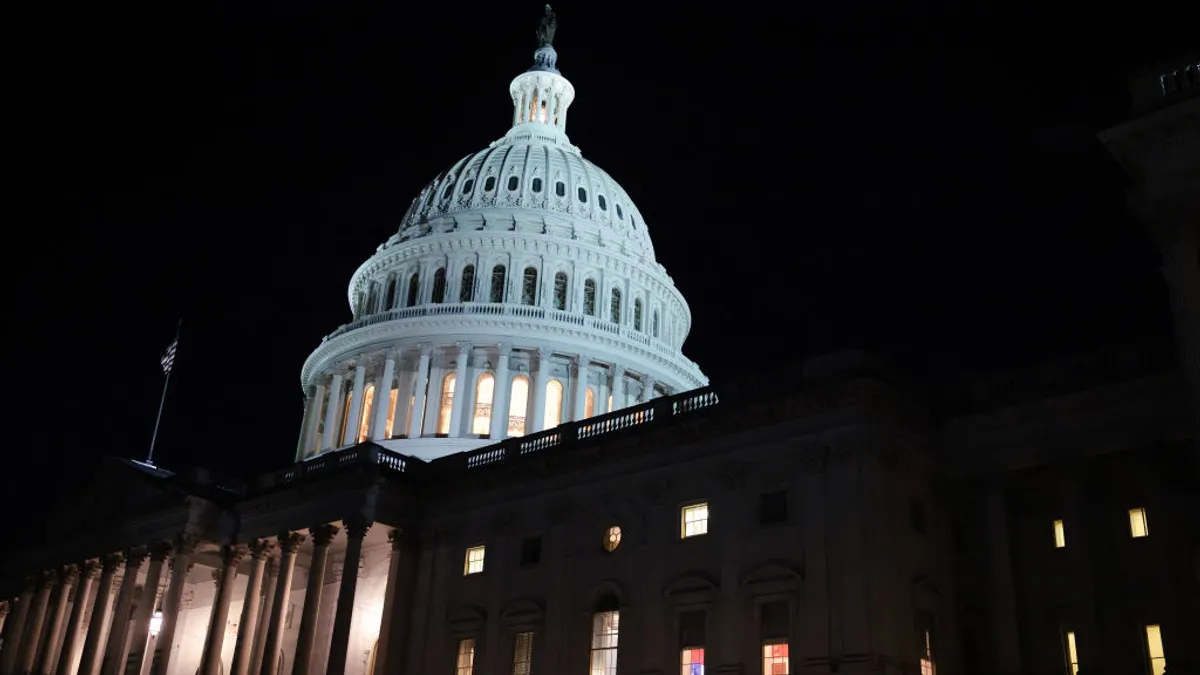Dive Brief:
-
In a nearly unanimous vote, the U.S. Senate removed a controversial moratorium on state-level AI regulation from the One Big Beautiful Bill budget proposal on Tuesday morning. The Senate approved the full package Tuesday afternoon, sending the bill to the House.
-
Senator Marsha Blackburn, R-Tenn., introduced a repeal of the addendum Tuesday, after removing her support for an initial compromise with Senator Ted Cruz, R-Tex., to shorten the freeze to five years and introduce a handful of use case exemptions.
-
“While I appreciate Chairman Cruz’s efforts to find acceptable language that allows states to protect their citizens from the abuses of AI, the current language is not acceptable to those who need these protections the most,” Blackburn said in an emailed statement. “Until Congress passes federally preemptive legislation like the Kids Online Safety Act and an online privacy framework, we can’t block states from making laws that protect their citizens.”
Dive Insight:
As the budget bill heads to the House, the repeal of the proposed moratorium on state-level AI legislation underscores the complexity of regulating the technology — and the need for CIOs to track how the situation evolves.
Detractors of the freeze praised the Senate's repeal and stressed the need for comprehensive AI regulation.
Consumer advocacy organization Public Citizen called on Congress to create “strong, enforceable AI legislation that sets a federal floor to protect consumers, workers and creators from the real harms AI poses to public safety while allowing states breathing room to quickly respond to AI harms as they evolve,” said J.B. Branch, big tech accountability advocate for the organization, in an emailed statement.
A group of 17 Republican senators criticized the moratorium in a Friday letter sent to Congress leadership. Arkansas Governor Sarah Huckabee Sanders, who was among the signatories, praised Blackburn's successful repeal of the freeze on Tuesday.
For CIOs, the fast-moving landscape of AI regulation emphasizes the need to help their organizations address compliance while curbing AI risks internally.
“CIOs shouldn’t treat this as breathing room, but rather a warning,” David Brudenell, executive director at AI company Decidr, said in an email. “A lack of regulation doesn’t mean a lack of risk. While Washington stalls, the EU is already enforcing guardrails and China is scaling deployment. U.S. firms can’t afford to wait.”
To prepare, executives can start by building guidelines on existing technology.
“The sharpest CIOs are moving now; building internal policies, interrogating how their AI makes decisions and getting ahead of the scrutiny that’s coming,” Brudenell said. “Not just from regulators, but from employees, customers and investors.”
The Senate’s vote to remove the moratorium lets states continue to develop and enact AI-specific legislation, continuing a piecemeal approach to AI regulation, said Jennifer Everett, partner in Alston & Bird's technology and privacy practice.
“While there remains no comprehensive AI law … Congress’ decision does not mean there is no oversight,” Everett said in an email. While Congress could eventually move toward federal legislation on AI, the more likely scenario is that companies will need to learn to comply with a patchwork of state-level AI regulations, she added.















